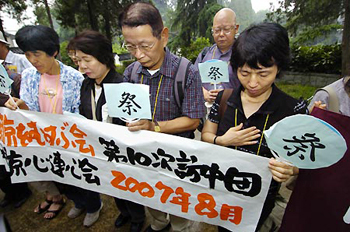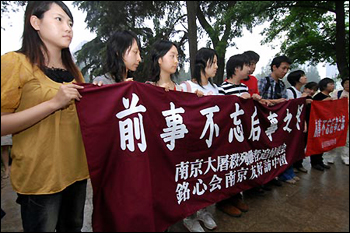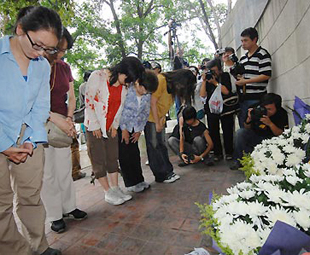Sixty-two years after Japan's surrender in the Second World War on Wednesday, Japanese and Chinese marked the event together with calls for world peace.
In Nanjing, the capital of east China's Jiangsu Province where the notorious Nanjing Massacre occurred, a 48-strong delegation of the Japanese left-wing group Mei Shin Kai commemorated the day.
"We pledge today to continue working for world peace and telling people the true history," said Matsuoka Tamaki, a primary school teacher from Osaka and head of the delegation.
Japanese people mourn for the Nanjing massacre victims during a peace rally in Nanjing. Both Chinese and Japanese people took part in the peace rally on Wednesday, mourning for the 300,000 Chinese people killed in Nanjing by Japanese invading troops in 1937.
Tamaki started visiting veterans of the war in 1998 in the hope of discovering the truth about Japan's controversial history. Based on the accounts of six veterans, she identified a site in Nanjing, where more than 1,000 Chinese were killed during the massacre.
According to her findings, the victims were led to Taipingmen in east Nanjing on December 13, 1937. They were bayoneted, shot or forced to step on land mines.
To make sure everyone was dead, the Japanese soldiers conducted a thorough search the next day and bayoneted those who still breathing, Tamaki said.
"This is a new finding," said Zhu Chengshan, curator of the Memorial Hall of the Victims of the Nanjing Massacre. He noted that more than 20 sites, most by the Yangtze River, have been recognized as massacre sites.
Zhu said that he would erect a memorial monument at the Taipingmen site.
Invading Japanese troops occupied Nanjing on December 13, 1937, and launched a six-week massacre. Chinese records show that more than 300,000 people, not only disarmed soldiers but also civilians, were murdered.
Japanese college student Hitomi Fukugawa, 21, visiting China for the first time, said she was astonished at the survivors' stories. "In Japan I learnt little about the invasion, but now I feel I have more to learn," she said.
Northeast China's Heilongjiang Province celebrated the first Peace Day in Qiqihar on Wednesday. This is the site of the first battle against the Japanese after they launched their invasion on September 18, 1931.
Japanese people mourn for the Nanjing massacre victims.
Performances were held to mark the day the war ended. More than 3,000 pupils drew peace symbols on an 815-meter-long banner.
"We should remember the tribulations of war on this day and cherish peace," said businessman Wang Xinghai, 35, at the memorial wall on Peace Square.
In Shenyang, the capital of Liaoning Province, elderly people gathered to recall the war.
"I saw a Japanese soldier kill a six-year-old kid with his bayonet and then slay a newlywed couple," said 87-year-old Sun Shizhenin sorrowfully.
Veteran Shan Lizhi, 96, said, "All our sacrifices were made for peace and prosperity."
"Remembering history doesn't mean harboring hatred," said Wang Jianxue, head of the Warfare Research Institute "9.18". "Our country was weak then, and we should tell our young people to work hard for China's rejuvenation."
In Beijing, a set of surgical tools and the wooden trunk used by Canadian surgeon Norman Bethune were donated to the Chinese Museum of Anti-Japanese War on Wednesday.
Dr. Bethune came to China in 1938 and set up a front-line mobile hospital where he operated on wounded soldiers. He is credited with saving thousands of lives.
In Chengdu, the capital of Sichuan Province, more than 200 people laid flowers at the monument for dead Sichuan soldiers, a bronze statue of a soldier in a bamboo hat, carrying a grenade and holding a gun facing east.
During the eight-year war, about three million Sichuan soldiers fought and more than 600,000 died.
Holding a bouquet of white chrysanthemums, a man in his 70s who declined to be named said, "We should never forget those who died for the liberation of our country. We must value the peace they gave us."
(Xinhua News Agency August 16, 2007)




